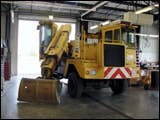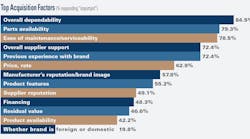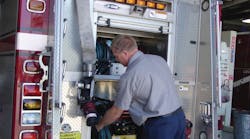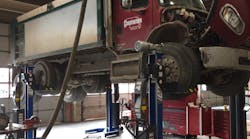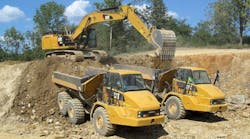|
|
|
|
This year's AEMP public and private Fleet Masters Award winners may have many differences in the regulations, restrictions and region of their operations. But they share a common interest in maximizing the use of fleet-management software to reduce costs, increase staff productivity, and improve the quality of services they provide to their diverse clients and customers.
It is an interest they share with many executives who use every tool possible to maximize the value of fleet resources. Looking at the ways fleet-management software improves operations can reveal processes and applications that immediately help managers relieve some of today's business pressures.
Masterful approaches
Rudy Payton, CEM, is assistant director of equipment services for the 2005 Public Fleet Master Award winner, the City of Fort Worth, Texas. He oversees a fleet of 4,200 units, including 1,400 pieces of heavy equipment. His department currently uses an aging main frame-based fleet-management system, but he's in the market for a new, server-based system.
"Many software firms have good products, but the question is, do they have a product that fits your needs?" says Payton, who will have chosen a system by press time and plans to have it in operation by the end of the year.
Dave Greenlee, fleet manager for Alyeska Pipeline Service Company in Anchorage, this year's Private Fleet Master Award winner, concurs.
"First, determine what you want to get out of a system," says Greenlee. "Then look at the characteristics of many, and then visit fleet managers who are using the programs you like."
Payton says is it important to know the number and type of reports produced by software programs. "Our in-house system has 60 reports we run on a daily and weekly basis," he says. "Yet we have seen some systems with only 25 standard reports, while others have up to 90 canned reports." The better software vendors allow for easy creation of custom reports as part of the initial installation, Payton says. He also is interested in the programs that will help automate generation of reports.
"We created a website as part of the city's Intranet to update our clients about the status of their vehicles," Payton says. "We manually update the information at 10 a.m. and 2 p.m. so they have a very good feel of what is happening." Payton is looking to ensure his new software will be able to automatically post those reports. "That frees up my people to do more long-range analysis," he says.
Another improvement that will benefit Payton is the ability for clients to create their own reports through a web interface. "Instead of my staff being bogged down with 15 or 20 requests a day to generate data for clients, I can put them to work on other projects," he says.
Prices for programs suitable for his staff of 126, including 96 mechanics, can range from $100,000 to $150,000, according to Payton. Although he does have a direct calculation of potential return on investment, Payton says that a major goal is to use the ability to track data on engine types, drive trains, tires and other items in order to create future specifications to consolidate inventory and reduce training expenses.
Greenlee maintains an annual license with Maximus' Fleet Focus for Alyeska and its subcontractor, ASRC Energy Services Pipeline, Power and Communications Inc. The license allows them to obtain software upgrades and a preset amount of service, which can include creating new reports.
"This year, Maximus provided us with a data clean-up to help transition to the upgraded software, which included a new Shop Scheduling module," Greenlee says. "We had been scheduling in a different module, but the new one will help us be more efficient."
Greenlee's three large shops have wireless connectivity that permits each mechanic to use a laptop that easily connects to the system for easy schedule tracking and information sharing. Although he doesn't track time saved due to the use of the new system, Greenlee says there was a decided improvement in morale among mechanics after they were equipped with software and hardware that allowed them to spend more time on their craft and less time with administrative duties.
Software savings
Marilyn L. Rawlings, CEM, fleet manager for Lee County, Fla., and AEMP president-elect, has an annual licensing agreement with CCG Systems, makers of Faster. Rawlings pays approximately $5,000 a year for the licensing fee for software used by her 30-person staff to manage a 1,400-vehicle fleet, including 300 pieces of heavy equipment. "If I didn't have the software, I would need another four or five people on my staff," she says. "I consider that $5,000 a year to be very inexpensive labor."
Lee County had obtained the software before she came on board, so Rawlings didn't have to budget for the initial set up costs, which she estimates at between $80,000 and $150,000, depending on fleet size and performance needs. Yet, she says, "for someone who hasn't had a system, the initial costs can be intimidating. But in the long run, the return on investment is incredible."
As she sees value, Rawlings adds specific modules, such as a graphic package she purchased this year for approximately $2,500. The new capability allows digital photos to be included in an equipment file.
"Documenting body damage is the big goal, but it also helps when talking with government officials who sometimes don't know the difference between an excavator and a backhoe," Rawlings says. "If the module cost $50,000, I wouldn't have added it, but at the price we paid, it was valuable."
Lee County recently started tracking parts inventory with a bar-code system that feeds data into Faster. Minimum and maximum stocking levels are being adjusted to reduce surplus parts in the warehouse with the goal to establish a "just-in-time" parts warehouse rather than a "just-in-case" warehouse, according to Rawlings.
"We significantly reduced obsolete inventory in the parts room and received $30,000 in vendor credits and anticipate more savings in the future," Rawlings says.
The bar-code module costs $2,400, and another $2,000 to $3,000 buys a single bar-code reader, a printer, labels and other supplies.
Fuel system integration
Rawlings also values Faster's ability to integrate with her RNI fuel-monitoring system from Automotive Computers and Equipment. The system allows wireless readers at pumps and transmitter rings in fuel tanks to interact. If a person tries to pump regular gas into a diesel-powered vehicle, the system will shut down the pump. The system costs about $250 per vehicle for transmitter rings and $9,000 per fueling station for hardware and wiring, according to Rawlings. She says the fuel-usage tracking is imported automatically into Faster, where she can note potential issues if fuel usage is inordinate.
An added benefit, Rawlings says, is that she can turn off a vehicle's fuel privilege "with the push of a button." If preventive maintenance is scheduled and an operator doesn't bring in the vehicle, she can prevent it from fueling from the County's pumps. "When they call to say there's a problem, I say, 'Bring it in, and we will look at it.'" This gives mechanics the opportunity to run the PM while Rawlings pushes another button to reactivate fueling privileges.
Rich Deeds, CEM, fleet manager for Brubacher Excavating in Bowmansville, Pa., also enjoys the benefits of a fuel-monitoring system integrated with his fleet-management software. The process is operating so smoothly that he plans on migrating his operation to a severity-based maintenance system, which triggers PMs based on fuel-usage calculations. In 2002, Deeds moved from a fleet-management software system he developed on his own to Connect Plus, which was developed internally by Kenworth and Peterbuilt, until the unified companies released the program for purchase by others.
"The software has the capability to create severity-based PMs," Deeds says. "It is a matter of making time to adjust the specifics of each machine. There are scientific formulas based on displacement of engines, amount of oil, type of drive train, and other parameters that allow accurate fuel-usage calculations."
The program will allow for variation in calculations based on whether equipment is pushing bulk dirt, performing fine grading, or other issues. Using Connect Plus will allow Deeds to make his calculations with confidence, although there is always some finessing required.
"For example, you have to be careful about some trucks that idle a lot," he says. "They don't use much fuel, but it is hard on the oil so you have to compensate your calculations in the program."
Deeds says he's confident moving to the new PM process because Connect Plus has interacted well with Gas Boy, his fuel-monitoring program. If someone transposed numbers entering the mileage or the amount of gas used, Connect Plus will create an alert, according to Deeds. Connect Plus will indicate if it is likely that there was a human error, if an hour meter stopped working, or some other type of error occurred. "If needed, we can generate a work order to have the problem fixed right away," Deeds says.
Deeds says he appreciates the web-based nature of Connect Plus, which charges a monthly fee for secured Internet access by as many people to as many pieces of equipment Deeds desires. Brubacher has approximately 225 pieces of heavy equipment with as many as 360 in the summer, including rentals.
"But we also have 1,000 other units, such as generators and pumps, that are on the system," he says. "The price for other software that charges by unit was up to three times as much as Connect Plus." Deeds paid approximately $20,000 for the initial set up and custom reports and pays a preset monthly usage fee.
Deeds moved from his in-house program to Connect Plus when he decided to automate and improve tracking of dispatch functions. "It would have cost a lot of money to have a dispatch module integrated into our software, plus it was time to look at something web-based," Deeds says.
Installing a wireless Internet connection in field supervisors' laptop computers allows Deeds to e-mail a dispatch schedule to them every day. The supervisors can mark their pieces of equipment as either "up" or "down," report problems, request unscheduled maintenance requirements, and make other comments before responding to the central system.
"Most programs have more capabilities than you will use and it will be missing something you wish you had," Deeds says. "And many of the programs are designed around municipal-fleet management."
Although Connect Plus most closely suited his needs, Deeds is still looking to make adjustments to meet his specific requirements. "I am not happy with the downtime information," he says. "Anybody can click a piece of equipment up or down, but not why it is up or down. We will pay extra to have that improved for us, if it is not fixed in an upgrade of the software."
Fleet-management software is not a cure-all, but the technology can be an effective tool to help increase efficiency when fine-tuned for each specific application.


